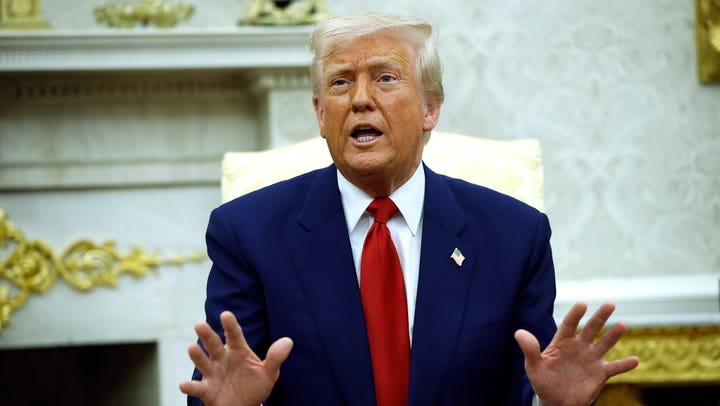Congress did nothing to stop Trump's tariffs, and people like us pay the price | Opinion
It's one thing to have President Donald Trump destroy our economy. It's another for Congress to just let it happen.

On April 9, President Donald Trump suddenly reversed course on his plans for sweeping "reciprocal tariffs," responding to the pressure of a panicking stock market.
Earlier this week, reports emerged that as many as seven Senate Republicans would be willing to vote for a bill curtailing Trump’s authority to set tariff rates. Democrats seemed eager to force a vote on the issue of presidential tariffs, and Republicans should be glad that Trump rescinded his most extreme tariffs so they no longer have to explain that position to voters.
But don't expect Congress to help us out anytime soon. America is likely subject to Trump’s poorly conceived whims on tariffs for the foreseeable future and Republicans still don't seem interested in stopping him, no matter how much he's hurting the economy.
Congress should be thanking Trump for reversing course
Prior to Trump's decision to backpedal, Democrats made their intention clear: They wanted to force Republicans to choose between voting to ease tariff pain or backing Trump. A vote on the matter was reportedly likely after the recess.
The dilemma facing swing district Republicans was their worst nightmare. Going against Trump here could mean a primary challenger, but backing him could subject them to a flurry of attacks from their future Democratic opponents.
How Republicans eyeing close election races in 2026 would have voted on the president's tariffs could have revealed how solid Trump’s grip on the GOP remains 100 days into his term.
Republicans should be forced to make their position clear on the No. 1 issue facing Americans under Trump: the economy. Now, with most of the most egregious tariffs walked back, Republicans facing angry voters have been given room to breathe.
The American people still deserve to know which Republicans are blindly indebted to the president’s incoherent economic plan and which still have a spine.
In the meantime, Republicans should figure out whom they fear more, Trump or their own voters.
Congress is unlikely to bail us out from Trump's horrible policies
Perhaps the most maddening part of Trump’s tariff scheme is that the authority to tariff is constitutionally prescribed to Congress, not the president.
Trump gets around this by claiming national emergencies, which allow him to set tariff policy because Congress has delegated the executive branch the authority to do so in times of emergency.
The problem is that Trump is the one who decides what constitutes a national emergency. In this case, he’s decided that our trade deficit in itself is a national emergency, as idiotic as that is, and it has allowed him to set tariffs on basically every country on earth.
Trade deficits do not represent national emergencies. Nations that manufacture goods on our behalf allow us to bypass expensive American labor, free up employment for other sectors and enable American consumerism. That's not an emergency. That's a free market.
Legislators are becoming more open to the idea of rescinding the president’s tariffs, but their task is quite steep. Not only do they need to reach a majority in the House (requiring Republican defections), they also need to reach 60 votes in the Senate to bypass a filibuster (also requiring Republican defections).
The real death knell for the pipe dream of Congress bailing us out is that Trump has already stated his intent to veto any legislation curbing his ability to tariff, obviously. No pro-tariff president is going to allow Congress to take away authority central to his economic policy platform.
Once again, Congress cannot be counted on in the slightest to help bail Americans out from Trump’s incompetence, at least not under the current landscape.
For now, the fear of a Trump-endorsed primary opponent remains scarier than the threat of losing your seat to a Democrat in the midterm elections. That could change.
Congress should keep this saga in mind before lawmakers delegate authority that is theirs in the future. Even when the legislative branch allows the president to take certain actions in times of emergency, it opens up the potential for abuse. The executive branch decides what constitutes an emergency, and those emergencies can be legitimate ‒ or exist only to serve the president’s policy preferences.
Dace Potas is an opinion columnist for Paste BN and a graduate of DePaul University with a degree in political science.